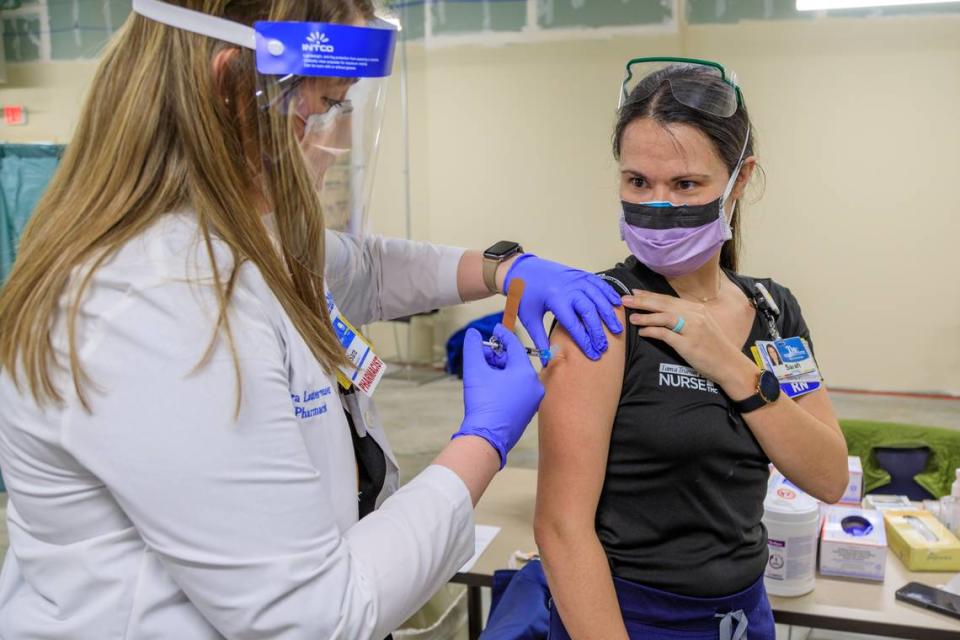Kansas City hospital mandated COVID shots for employees. Here’s how many left instead
Thirty-nine employees of Truman Medical Centers/University Health have resigned rather than comply with the health system’s new COVID-19 vaccination mandate — amounting to less than 1% of workers there, hospital officials said Tuesday.
In July, Truman was the first hospital in the Kansas City area to require employee vaccinations. It gave approximately 5,000 workers until Sept. 20 to get vaccinated or find employment elsewhere. The mandate followed the rapid rise in hospitalizations caused by the COVID-19 delta variant.
“We had amazing support from our team on this,” said Truman president and CEO Charlie Shields. “Overall, the majority of our team members thought this was the right thing to do. They were very proud that Truman led the way in vaccinations, led the way in testing and is now leading the way with the mandate on employees.”
A “few” employees requested exemptions for medical or religious reasons, said Shields, but he didn’t have an exact number. The employees who “effectively resigned,” he said, came from across the entire health system and didn’t affect one area more than another.
After Truman, Saint Luke’s, the University of Kansas Health System and Children’s Mercy issued similar vaccination requirements for their employees, setting various deadlines that stretch to mid-December.
Truman’s announcement in July came on the day that nearly 60 medical organizations, including the American Medical Association, called on health care and long-term care employers to require their workers to get the COVID vaccine.
The groups pointed out that many of those employers already require employees to be vaccinated for influenza and hepatitis B.
Truman administrators wanted to show the public that the vaccines are safe.
“As an academic medical center we base every decision on science,” Shields said in July. “And the science on the safety and efficacy of these vaccines is very clear to us.
“We want to make sure that people understand that we feel they’re safe, we feel they’re effective, they prevent hospitalizations, they prevent death and it’s the right thing to do. And we’re going to lead by example on that.”
In December, Truman created a media event to showcase one of its nurses getting a COVID shot, one of the first people in the area to do so. Shields has a photo of that first vaccination on his office wall.

But hospitals and long-term care facilities have struggled to get employees vaccinated, much to the consternation of their bosses. When Truman mandated the shots, about 70% of its employees had been vaccinated.
When Saint Luke’s mandated vaccines in August, hospital officials said about 65% of their 12,000 employees were already vaccinated. The rest have until Oct. 30 to comply.
When Children’s Mercy announced its mandate on Sept. 16, president and CEO Paul Kempinski said that about 80% of employees already were fully vaccinated. Employees there have until Dec. 15 to get both doses of the Pfizer or Moderna vaccines, or the single dose Johnson & Johnson vaccine.
KU’s vaccination requirement, which came with a deadline of Dec. 1, spurred a small protest outside the hospital earlier this month.
The hospitals have taken the lead in a metro where most area businesses hesitate implementing employee vaccine mandates, fearing lawsuits and losing workers, according to a Greater Kansas City Chamber of Commerce survey.
The message of Truman’s success, said Shields, “is that people who work in health care take their role in health care and their mission of caring for people and not putting patients in danger very seriously.
“So the fact that we had such a high compliance rate with this goes back to why people are in this business in the first place — it’s to take care of people and make sure people are safe.”

